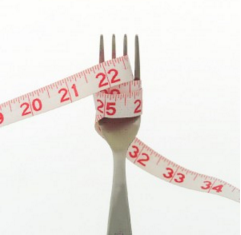We often hear about eating disorders in the news, and frankly I find them alarming!

Having read up on the matter, I think we should start addressing it much earlier than we are! Children should be taught about health and fitness from a very young age! Food Tech and P.E lessons don’t really do enough to counter the negativity surrounding body size and image!
Samantha Swinglehurst MBE from London’s Royal Free Hospital supports the idea of early referral to specialists should any issues surrounding diet appear. It is far easier to treat someone at the beginning than once the brain has been starved of nutrition and the patient literally cannot eat! As a specialist she explains she prefers to see someone before they’re so far advanced that she feels like they are slipping through her fingers.
It is also worth bearing in mind that hospital treatment can work for some but it does carry risks warns Samantha. ‘Residential units have their place but can be detrimental to patients as they compare weight-loss tips. So if you can avoid that route by early diagnosis, it’s usually better for the patient’.
Parents should trust their instincts and watch for warning signs. There are some misconceptions that eating disorders are about wanting to be skinny, but that isn’t the case. There are many triggers and in most cases it has to do with control. Former Big Brother star Nikki Grahame’s battlewith anorexia had a lot to do with her parent’s divorce, she openly admits that food was the only thing she could control at the time. Although thankfully she has recovered, she has been left infertile and suffering from osteoporosis.
So, as a parent these are the things to work towards:
- Communication is essential to help with recovery, so even if your child is reluctant to open up, keep trying.
- Learn as much as possible about eating disorders to understand what you are dealing with.
- Don’t blame or judge. Concentrate on their feelings, stay calm and be prepared for a negative response.
- Emphasise that no mater what, you love them.
- Avoid talking about appearance, even as a compliment. Build their confidence in other ways, praising them for being thoughtful or for their achievements.
- Avoid talking about other people’s diets or weight problems.
- Don’t feel hurt if they don’t open up and don’t resent them for being secretive. It’s not a reflection on their relationship with you.
- Ask what you can do to help!
And remember, you as the parents may need the help too! Seek your own help and make it important to work together as a family!
For more info, vist www.nhs.uk/Livewell/eatingdisorders